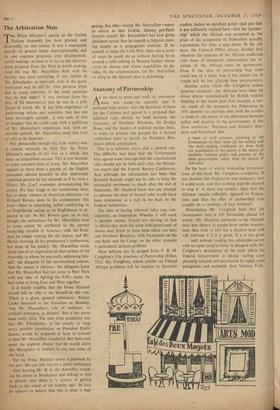The Arbitration Man
rrliE Prime Minister's speech to the United I Nations Assembly has been praised, and deservedly, on two counts. It was a reasonable speech—its general theme unexceptionable, and. its one concrete proposal, over disarmament, worth making—at least in so far as any disarma- ment proposal from the West is worth making. And the way Mr. Macmillan dealt with his heckler was most satisfying. It was foolish of Mr. Khrushchev to interrupt, even in the good- humoured way he did (by what perverse whim did so many reporters of the scene maintain that he was angry? It was obvious from the film of his interruption that he was in a jolly frame of mind). Mr. K has little experience of performing before any assembly that has not been thoroughly packed: it was rash of him to imagine that he could cope with a poliiician of Mr. Macmillan's experience, and, with ad- mirable aplomb, Mr. Macmillan made him look as silly as he deserved.
Yet, pleasurable though this little victory was, it cannot seriously be held that the Prime Minister's speech, or his visit as a whole, has been an unqualified success. This is not because, to some watchers here at home, Mr. Macmillan appears to have been a parody of the English statesman abroad (notably in that elaborately contrived gesture he has adopted, as if he were a 1Vhat's My Line? contender demonstrating his mime). We may laugh at his mannerisms here, but to many viewers on American television—as Richard Rovere hints in his commentary this week—there is something rather comforting in an Englishman acting as an Englishman is ex- pected to act. As Mr. Rovere goes on to say, though, the enthusiasm for Mr. Macmillan must to some extent be attributed to the current leadership vacuum in America—with the Presi- dent no longer making his old impact, and Mr. Herter showing all his predecessor's tactlessness, but none of his quality. Mr. Macmillan made much less of an impression on that section of the Assembly to whom he was really addressing him- self: the delegates of the uncommitted nations. And the reason is obvious: the delegates knew that Mr. Macmillan had not come to New York with any idea of fighting the UN's cause; he had come to bring East and West together.
It is barely credible that the Prime Minister should still be able to see himself in this role. `There is a glum, general admission,' Alistair Cooke lamented in the Guardian on Monday, 'that Mr. Macmillan's role of mediator, or civilised arbitrator, is defunct.' But it has never been really alive. The only faint possibility was that Mr. Khrushchev, in his anxiety to heap every possible humiliation on President Eisen- hower, would be prepared at least to pretend to find Mr. Macmillan wonderful. But there was never the slightest chance that he would allow Mr. Macmillan to mediate in any real sense of the word.
Yet the Prime Minister seems hypnotised by the part. He can still inform a press conference --after hearing Mr. K in the Assembly, watch- ing his antics in Manhattan and talking to him in person--that there is `a chance of getting back to the mood of six months ago.' In 'fact, he appears to believe that this is what is hap- pening. But who—except Mr. Macmillan—wants to return to that foolish, illusory pre-Paris Summit mood? Mr. Khrushchev has now given abundant notice that he regards a Summit meet- ing simply as a propaganda exercise. If he wanted to relax the Cold War, there are a score of ways he could do so without having to sit around a table talking to Western leaders whose views he detests and whose capabilities he de- rides. In the circumstances, for Mr. Macmillan to cling to the Summit plan is disturbing.










































 Previous page
Previous page